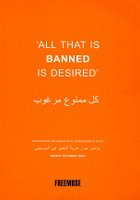 In republishing Veronica Doubleday’s book “Three Women of Herat: A Memoir of Life, Love and Friendship in Afghanistan” 18 years after its first publication, the London publisher Tauris Parke Paperbacks has brought to a new readership a classic on Afghan society and culture.
In republishing Veronica Doubleday’s book “Three Women of Herat: A Memoir of Life, Love and Friendship in Afghanistan” 18 years after its first publication, the London publisher Tauris Parke Paperbacks has brought to a new readership a classic on Afghan society and culture.Doubleday writes: “It is my hope that the republication of this book will help to offset the misapprehensions and prejudices about Afghanistan that abound in the popular Western imagination. It is important for people to know about life there during times of normality, before the traumas and upheavals of invasion and war.”
Doubleday got to know the “three women” – Miriam, Mother of Nebi and Shirin – while she was living in the western Afghan city of Herat in the mid-1970s with her ethnomusicologist husband John Baily, who was researching Afghan music. At the beginning of each chapter of her book is one of her charming drawings of Herati people.
The book was first published by Jonathan Cape in 1988, and in a postscript Doubleday describes how in March 1994 she was able to return to Herat for the first time since the 1970s on board a UN plane. She and her husband made a further visit in spring 2004.
In the 1970s Doubleday and her husband spent two separate years in Afghanistan, with a shorter period in between. At the beginning of their second year, 1976, Doubleday decided to withdraw from public life and the world of men, in which she had been accepted an “honorary male visitor”, and to explore the world of women.
By then she could speak their Persian language, and by sharing and performing the women’s music she entered further into their sphere. She adopted the veil, and although she had mixed feelings about this she found it quite liberating in bringing a “welcome privacy”.
Doubleday gives a fascinating, detailed account of domestic life, family structures, relationships, marriage rituals, celebrations and traditional medicine. She builds up memorable portraits of the three women she got to know best.
Miriam was the daughter of a hereditary musician who was the authority on classical music in Herat. Mother of Nebi was a more isolated, troubled character. An accomplished performer of rural songs, she was intelligent and creative and had a reputation as a diviner. But Doubleday found her “chained and smothered by an ignorant, bigoted husband.”
Shirin, the most famous Herati female singer, had an all-woman band, and Doubleday first encountered her performing at a wedding. “She had a rippling, clear, light voice with a sweet sound that suited her own name, which itself means ‘sweet’.” Doubleday took music lessons from Shirin and became a member of her band, adopting the name Farahnaz. Some people were scandalised that Doubleday had joined the band.
To this day Doubleday continues to perform traditional Afghan music with her husband at concerts in Britain and beyond. Through her writing, performances and deep commitment she has made an essential contribution to the knowledge of Afghan culture.
Susannah Tarbush
Saudi Gazette 25 July 2006



